Social Media Marketing Course : A Strategic Playbook
Our course brings you 14 years of proven marketing experience, honed from working with over 100+ clients worldwide, to teach you the social media marketing that truly works.
Whether you’re a marketer, business owner, or student, Suite Courses will empower you to level up your social media marketing skills.
Let’s shape your social media marketing journey with Suite Courses!
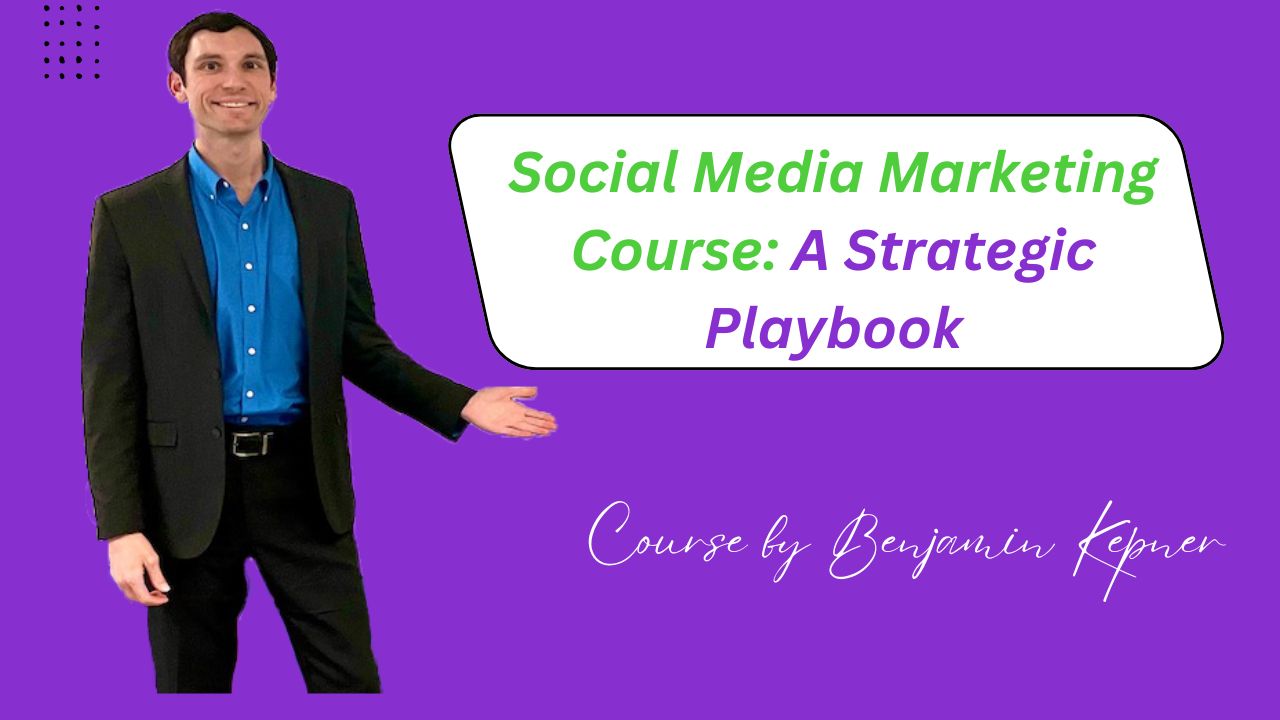
- Online
- All levels
- 30 - 60 days
- $299
Our Social Media Marketing Course Includes
In today’s fast-paced marketing world and with the evolution of AI & technology, video lessons alone are not enough to scale Social Media skills. Considering this, we are taking one step ahead and offering the following materials to level up your social media skills.
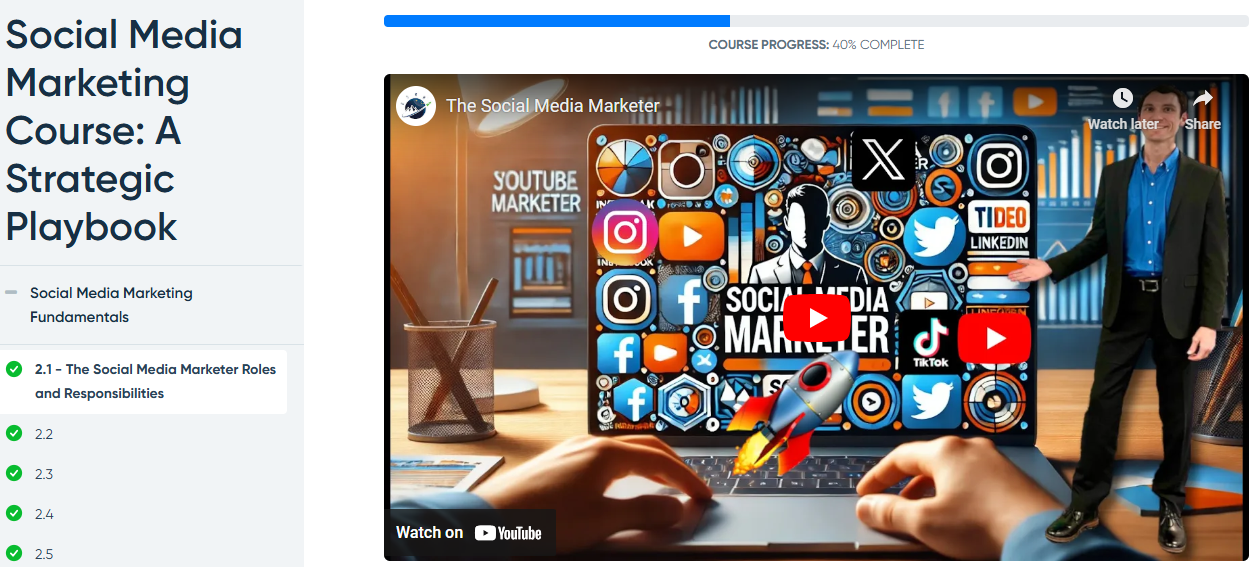
15 Video Lessons
Easily Accessible Valued-Packed Course Content
Understand complex and technical topics easily with explanations, real-world examples, screen shares, and step-by-step instructions. Plus, you can access video lessons anytime and anywhere to fit your busy schedule.
Marketing Frameworks
Build A BackBone of Your Social Media Strategy
To build a social media strategy you need expert-led templates and checklists to drive towards strategic directions. Don’t worry, because we will offer you relatable templates and checklists for social media marketing strategies.
ChatGPT Prompts
Leverage AI to Boost Your Social Media Game
Nowadays, AI is taking up space in Marketing and many businesses using AI. By keeping this in mind, we are giving you access to top ChatGPT prompts which you can use to boost your social media marketing game.
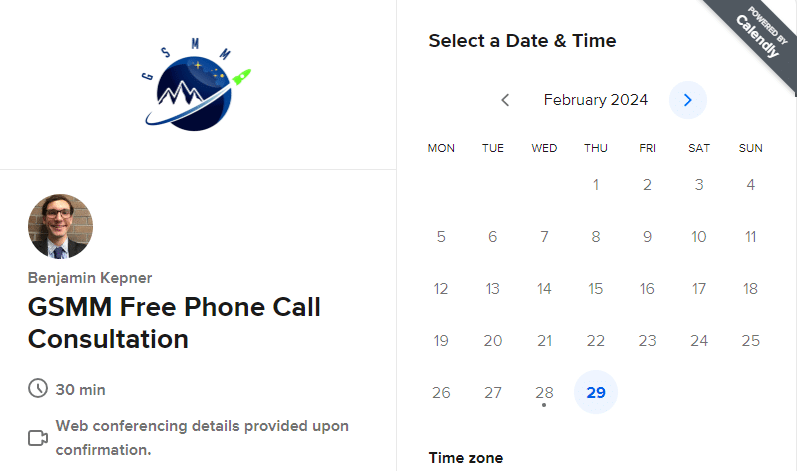
Strategy Call
Freely Meet a Professional Marketing Consultant
Consultants charge a lot of money. But after course completion, you can meet Benjamin Kepner at no cost. He is CEO/CMO and spent 14 years in Marketing driving growth for clients and an instructor for this course.
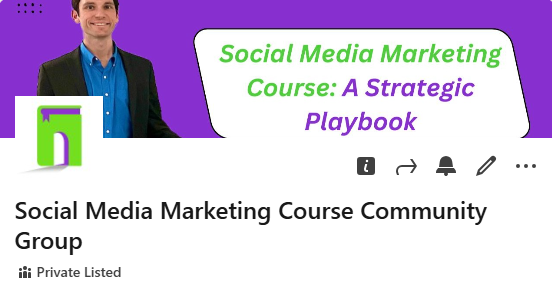
Networking Group
Unlock the Power of Students Community
A student network group to build connections, share ideas, get feedback, participate in group communications, and take inspirations. This will help you to enhance your learning journey by networking with fellow students.
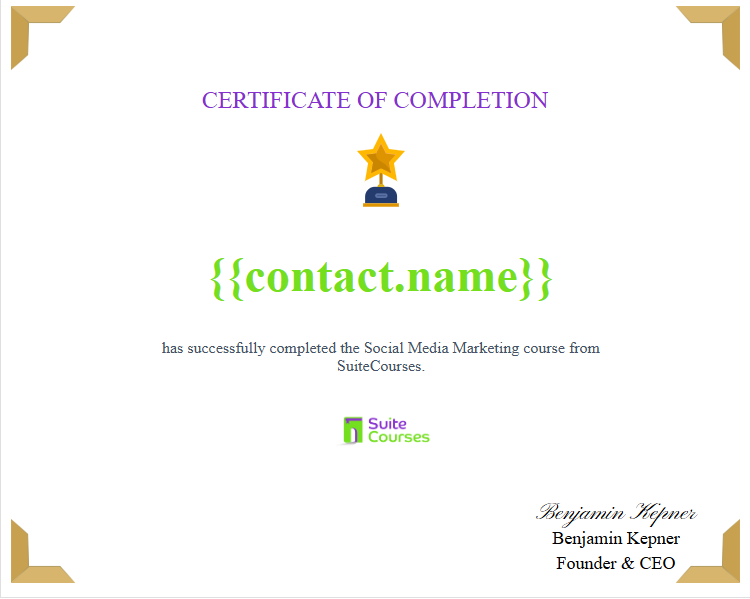
Exercises and Certify
Measure and Testify Your Learning Right Away
After every lesson, you will either get an exercise or a quiz to implement your knowledge right away. You will also get a course completion certification by Suite Courses which you can update across your LinkedIn and Resume.
How Much Do We Charge For Social Media Marketing Course?
Whether you’re a beginner looking to start strong or a professional wanting to level up your skills, our flexible pricing ensures you get the most out of your investment. For a limited time, we’re charging $299 as our launch price.
Why You Should Choose Our Social Media Marketing Course?
At Suite Courses, courses are taught by C-suites to fill the learning gap. Plus, our courses include practical insights after working with 100+ clients across 40 industries as we are also running a marketing agency. Here are a few more key points for why you should go with our social media marketing course.
C-Suite Instructor
Learn from a CEO/CMO of Suite Courses and Global Social Media Marketing, who have 14-years of marketing experience.
Flexible and affordable
Get our SMM course at just $299 as of now and learn from anywhere at any time as per your schedule.
1-Free Consultation Call
Have a consultation call with Benjamin Kepner, a CEO/CMO at no cost. He is driving growth for businesses and also shaping marketing careers.
Hands-On Learning
Shape your skills with expert explanations, real-world examples and experiences, screen shares, and step-by-step instructions.
Transparency
The course content, pricing, instructor and other course-relevant things are clearly mentioned on this page. No hidden cost!
Special Bonuses
Get marketing templates, checklists, chatgpt prompts and test your skills with exercises and quizzes. Plus, a Course Completion Certificate.
Social Meida Marketing Course Syllabus
Learning objectives:
- Define Social Media and discuss the impact it has had on society, culture, and economics.
- Understand the history and evolution of social media platforms.
- Summarize the ways in which global connectivity and the dissemination of information can be used to make impactful change.
Topics Covered:
- What is social media?: History of social media, The Evolution of Social Media, The Social Media platform, Choosing a Social Media Platform,
- Social Media in Society: Why do we share on social media, Creating Conversation through content, Best Practices in social media content,
- Social Media Aims: Who shares on social media,
- Business vs Personal: Case Study: A Tale of Three memes that became profitable, Case Study: Personal Branding: Dound the Pug
Learning objectives:
- Define the role of the social media marketer in relation to a client.
- Analyze social media as a business platform.
- Apply knowledge of the five pillars of marketing to real-world marketing situations.
- Employ various techniques to determine and support an audience.
- Construct a buyer persona.
- Explore best practices as they relate to branding and the company mission.
Topics Covered:
- The Social Media Marketer: Defining your Role, Conducting a Needs Assessment, Content & Copy CreationBuilding Relationships, Making business personal
- The Five Pillars of Social Media Marketing: Strategy, Planning, Listening and Engagement, Advertising: Organic vs Paid. Analytics
- Discovering Your Audience: Buyer Personas, Building a Loyal Following
- Defining Your Brand: Five Elements of Branding, What is Branding?
- Mission and Impact: Example: Coca-Cola, Community Markets
Learning objectives:
- Define content marketing and what elements make up good content.
- Identify best practices of content creation, curation, and marketing.
- Use the Content Marketing Matrix as an effective tool to plan a content strategy.
- Compare different methods of engaging audiences and turning engagement into sales.
- Analyze content as it relates to the buyer’s journey.
Topics Covered:
- The Business of Social Media: What is Engagement, Turning Engagement into Sales, Creating a Presence, Using Marketing Tools.
- What is Content Marketing? : Types of Content, The Content Marketing Matrix, Content and The Customer Journey: Awareness, Interest, Desire, and Action, Further Down the Marketing Funnel, Benefits of Content Marketing, Creating Effective Social Media Content, Best Practices.
- Content Strategy: Content Marketing Strategy, Content Stakeholders, Competitor Analysis.
- Creation versus Curation: Internal vs External Content, Branded Content, Content Audits,
- Engaging Audiences: Tips
- Building Content: Tips
Learning objectives:
- Describe different tactics that a marketer can use to gain a social media following.
- Define social monitoring and listening, and identify ways to use them in order to maintain and improve an online reputation.
- Apply the Pareto Principle to digital marketing and reputation management.
- Define Online Reputation Management and analyze best practices and good ORM results.
- Plan for a social media crisis and explore options for solving the problem.
Topics Covered:
- How to Build a Following: How to Gain Followers, Your Following: Quantity vs. Quality, Monitoring and Listening, Upfluence: A Monitoring and Listening Tool.
- Curating Relationships: Engage, Shaping Your Audience, Budgeting For Relationships, Retention is greater than Acquisition, The Pareto Principle: 80 – 20, Rewind: Further down the funnel, How to leverage social media.
- Online Reputation Management: What is ORM, The Benefits of Online Reputation Management, ORM in Action
- Crisis Management: What can a Marketer do in Crisis, Dealing with Crisis Examples, How to Manage a Social Media Crisis Communication Response, How to Avoid Another Social Media Crisis.
Learning Objectives:
- Outline the defining moments in the creation of Facebook.
- Describe the process of building a Facebook business page and establishing a presence.
- Analyze the Facebook Ecosystem in terms of how it can be used for marketing purposes.
- Explain the basics of Facebook marketing.
Topics Covered:
- Overview of Facebook: History of Facebook
- Establishing a Facebook Presence: Establishing Your Business, Create a Facebook Business Page, Facebook Business Page Best Practices, Finding Followers, Start Posting , Facebook Messenger, Brand Example, Facebook Insights, Engage, Discovery and adaption, Targeting Audiences.
- The Facebook Ecosystem: The college years, Facebook Groups, Some Group Statistics , Maslow’s Hierarchy of Needs
- Facebook Marketing: The advent of social ads, Facebook’s Marketing Tools, Facebook Insights and Metrics, Facebook Advertising Audience
Learning objectives:
- Outline the relevant history of Twitter and LinkedIn.
- Categorize content by which platform will have the best performance results.
- Justify decisions that a company would and could make on any of these platforms.
- Employ knowledge of best practices as they relate to building content on these platforms.
- Explore other platforms that might be beneficial to a business.
Topics Covered:
- Expanding Beyond Facebook: Picking your Platform, Using social media to direct traffic, Follow buttons, What is a HashTag, Types of Hashtags
- Instagram: About Instagram Platform, History, Marketing on Instagram, The Business Profile, Sponsored Ads, Photo Ads, Video Ads, Sponsored Stories, Reels, and Instagram Best Practices
- X(Twitter): About X platform, History, Marketing on X, X and the Buyer’s Journey, Follower Ads, Promoted Ads, Video Ads, Trend Takeover, X Best Practices
- LinkedIn: About Linkedin Platform, History, Marketing on LinkedIn, Linkedin and the Buyer’s Journey, The Basics, Sponsored Messaging, Dynamic Ads, Job Ads, Lead Gen Forms, LinkedIn Best Practices
- Other Platforms: A Calculated Determination, Reddit, Pinterest, Snapchat, TikTok, YouTube, NextDoor
Learning objectives:
- Demonstrate proficiency in using Upfluence to search for influencers.
- Devise an influencer marketing campaign that aligns with a company’s goals and content strategy.
- Identify communities and demographics to target for future conversion.
- Employ effective communication strategies to maintain relationships with influencers and their audiences.
- Establish new relationships with audiences.
- Analyze and interpret campaign data to increase profitability.
Topics Covered:
- What Is Influencer Marketing: Intro, Influencers vs Affiliates, Types of Influencers, Diversityfing Audiences, HelloFresh Brand Example
- Defining Your Goals: Strategy for Defining Your Goals
- Finding Influencers with Upfluence: What is upfluence, Searching for influencers on upfluence, Entering the conversation
- Creative Framework: Contracts, Budgeting for an influencer, Planning a Campaign, Content Calendar, The Magic of Multi-Hyphenates, Strategy to let your influencers works for you.
- Relationships All the Way Down: Communities, Diversifying Your Relationships
- Measuring Impact: Metrics to Track, Measuring workflow on upfluence
- Beyond Upfluence: Ways to Find Influencers
Learning objectives:
- Optimize a Facebook business page according to best practices and with consumer experience in mind.
- Use the Facebook Business Manager to organize campaigns and appraise and analyze the data that the interface produces.
Topics Covered:
- The Business Page: Introduction, Anatomy: Demo, Profile picture and name, Cover Photo, Call-to-action button, Page Navigation, Practice: The Facebook Business Page Best Practices.
- The Business Manager: Introduction, What is The Business Manager, Anatomy: The Business Manager Navigation, What is Facebook Pixel and what does it does, Standard Facebook Pixel Events, Practice: The Facebook Business Manager’s Best Practices
Learning objectives:
- Define the Facebook algorithm and describe how it influences what content each user sees.
- Debate the controversy surrounding the algorithm and its potential for damage.
- Identify the metrics and trigger words that contribute to the ranking of posts.
- Apply the best practices of Facebook marketing to make best use of the algorithm.
Topics Covered:
- What Is the Facebook Algorithm: What is it, The Process.
- The Evolution: Key moments in the history of the Facebook algorithm, Changing the algorithm, Ranking Signals, The Past: Trigger words, The Present: Meaningful Interactions.
- The Controversy: Facebook Whistleblower Frances Haugen Controversy.
- How to Hack It: Top Ranking Factors, Some don’ts.
- Algorithms Outside of Facebook: Intro to The Twitter Algorithm, Twitter algorithm: 10 tips, Intro to The YouTube Algorithm, YouTube Algorithm: 7 tips.
Learning objectives:
- Navigate the Facebook Ads Manager.
- Develop effective ad content using the Facebook Ads Manager.
- Prioritize decisions made in ad creation based on campaign goals.
- Analyze different audiences to determine targeting.
- Create effective budgets and plans for ad strategy.
- Measure the effectiveness of an ad with a mind to improve and optimize based on those results.
Topics Covered:
- The Ads Manager: Introduction, Linking Your Accounts
- Types of Ads: Types of Posts, Ad Formats, Ad Placements
- Ad Campaigns: Meta Advertising Policies, Levels of the Ad Campaign, Updated campaign objectives, Ad Placements, Ad Delivery options, The Meta Auction, What Makes a Bid. How to Bid.
- Targeting Audiences: Audience Types
- Budgeting & Scheduling: Intro, Cost Per Action, Facebook Ad Budget Budgeting types
- Best Practices
- Measuring Success
Learning objectives:
- Track data on social media with a mind for reaching goals.
- Analyze social media data using a variety of tools and with audience and rhetoric in mind.
- Report social media data analysis effectively and purposefully.
- Optimize social media accounts based on data analysis.
Topics Covered:
- Tracking: What is it, Tools for Tracking, How to Track Metrics.
- Analyzing, How to Do It, Facts and inferences
- Reporting: What to include in Reporting
- Optimizing: A/B Testing on Meta, Dynamic Creative Ads, Keep Testing
Learning objectives:
Compile and create an effective social media strategy for clients.
Topics Covered:
- Wrapping Up
- Defining Goals
- Auditing
- Research
- Handling Competition
- Making Adjustments
- Case Study: Bumble
Learning objectives:
Apply knowledge of content creation, social media marketing, and social media platforms to build a strategic content calendar.
Topics Covered:
- Why use a content calendar?
- Constructing Your Calendar
- Tips & Tricks
Meet Your Instructor

Benjamin Kepner
He is a CEO, Google Certified Trainer, Instructor, and Course Creator with 14 years of experience in Marketing and Advertising. He is helping brands to generate more sales and empowering learners to level-up their marketing skills with his courses.